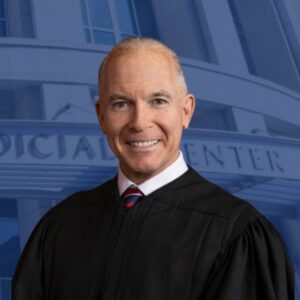Porn, obscenity and nepotism.
According to a new ad targeting Superior Court Judge Daniel McCaffrey, the Democratic candidate for state Supreme Court has been involved in all three.
McCaffrey’s supporters dismiss the charges as partisan politics, noting the ad is being run by the Commonwealth Leaders Fund, a PAC that supports Republican candidates, including his opponent, Montgomery County President Judge Carolyn Carluccio.
The two are facing off in the November 7 election to replace the late Justice Max Baer, who passed away in October 2022.
While charges and countercharges are common in politics, there are facts behind each allegation featured in the ad that are not in dispute.
For example, a 2014 review confirmed McCaffrey’s brother, Justice Seamus McCaffrey, did send or receive more than 230 emails that included sexually explicit content while serving on the state Supreme Court. Some of those emails went to Daniel, who, according to The Philadelphia Inquirer, “responded to one by asking his brother to send the message to his personal email address.”
The older McCaffrey’s porn content included some 700 to 800 pornographic images and about 45 videos. He resigned in disgrace in the wake of the scandal.
Also not in dispute is McCaffrey’s decision to hire his domestic partner, Samantha Riebow, to work for him as a judicial secretary in 2019. According to the ad, hiring his significant other is a violation of the state’s ethics rules regarding nepotism.
According to the Judicial Conduct Board of Pennsylvania code, “Nepotism is the appointment of a judge’s spouse or domestic partner, or any relative within the third degree of relationship of either the judge or the judge’s spouse or domestic partner, or the spouse or domestic partner of such relative.”
The McCaffrey campaign disputes the charge, arguing that because Riebow was originally hired by the county judiciary in 2006 and the nepotism rule in question didn’t take effect until 2014, Riebow wasn’t covered.
McCaffrey’s campaign sent DVJournal a copy of an opinion the judge sought from the Judicial Ethics Advisory Board. “Regardless of the specific nature of the employee’s relationship to you, given the initial date of hire of the employee (2006), it is the opinion of the Board that the restrictions of Rule 2.13 of the code would not apply to appointments made prior to July 1, 2014, the effective date of the code,” the opinion reads.
Matt Brouillette, treasurer of Commonwealth Leaders Fund, dismissed the response as “ludicrous.”
“By that absurd logic, the standard for judges only applies to judges who came into office after 2014. This shouldn’t be surprising, though; Dan McCaffery has already said he thinks the Supreme Court’s job is to change the laws. Apparently, he thinks he can change the rules so he doesn’t have to follow ones he doesn’t like,” Brouillette said.
Stacey Witalec, a spokesperson for the Administrative Office of Pennsylvania Courts, said it does not make legal judgments about judicial conduct. Instead, she forwarded DVJournal a “factual statement.”
“The individual you reference (Riebow) began her employment with the First Judicial District (FJD) of Pennsylvania in 2006 and was first assigned, along with numerous other FJD employees at the time, to Judge McCaffery in January 2014 when he assumed office as a judge of the Philadelphia Court of Common Pleas. Numerous staff from his FJD chambers transferred to the judges’ Superior Court chambers upon his election to the appellate court. The Code of Judicial Conduct, which denotes the standards for ethical behavior of judges and judicial candidates, was updated in Jan. 2014 to be effective beginning July 1, 2014.
“The new code addressed numerous topics, including the provision in Rule 2.13, which provides in part that “in making administrative appointments and hiring decisions, a judge shall…avoid nepotism, favoritism, and unnecessary appointments.”
So, did McCaffrey violate nepotism rules?
“As noted in public reporting on the updates to the conduct rules, which at the time were endorsed by the Pennsylvania Bar Association, the ‘change would only take effect going forward, grandfathering in existing hires.’”
In other words, Riebow would be grandfathered in despite McCaffrey bringing her along into his Superior Court office in 2019.
Brouillette disagrees, and he added there are many reasons voters should reject McCaffrey at the ballot box. He argues that McCaffrey also violated judicial ethics when he pledged to the carpenter’s union, one of his largest donors, that he would side with them over “greedy corporations.”
McCaffery is on the record saying he believes it is the Supreme Court’s job to “change laws that the Supreme Court thinks are necessary to change,” Brouillette added. “He wants the court to be a supra-legislature, ignoring laws created by the people’s elected representatives. This is dangerous to our democratic system of government.”
Also, McCaffrey “displayed a disgraceful lack of judgment in the case of his brother’s email porn scandal.
After receiving porn emails on his official government account, Dan McCaffery replied with ‘send this to my Yahoo account-not work,’” Brouillette said. “He then claimed he had no recollection of receiving the emails. Then he changed his story, saying this year, he did reply to the email with, ‘Please don’t send these to my work email.’ He said that was it; ‘Period, end of story.’ But this is much different from ‘Send this to my Yahoo account.’
“Dan McCaffery is unfit and unqualified to be a justice on our state Supreme Court,” Brouillette added.

